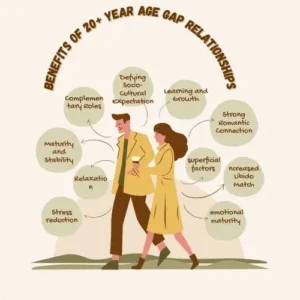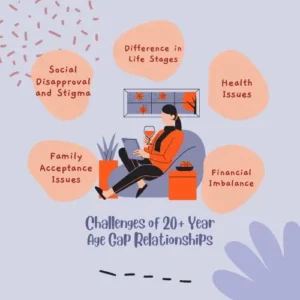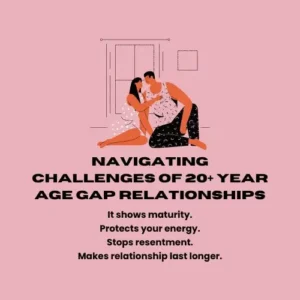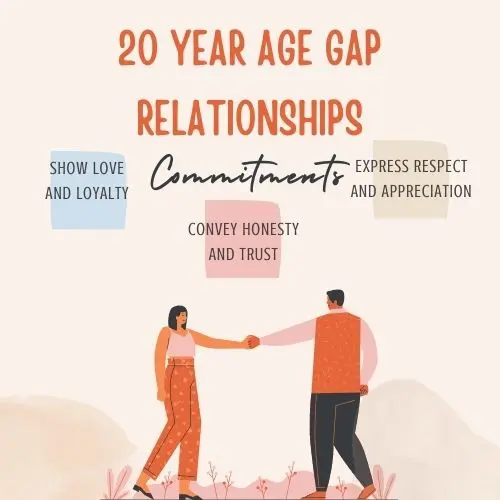Introduction
Relationships with a significant age difference are present in Hollywood movies and people’s everyday lives. Nevertheless, they still cause concern and controversies over their sustainability and legalization. That is, it is not wrong to get involved in a relationship with a person whose age is twenty or more years younger or older than you, although such relationships can be quite atypical. This implies that instead of coming with features which are quite similar to those introduced by other pronouns, they come with their advantages and constraints. So I won’t discuss some examples of such relationships to define the key aspects of such a connection.
Benefits of 20+ Year Age Gap Relationships

Contrary to popular assumptions, relationships with a large age difference can thrive when both partners acknowledge and address the inherent challenges. Some key advantages include:
- Maturity and Stability: An individual with a mature understanding of a lot of things which is why he or she is more likely to be financially stable in life and this can in one way or the other affect the relationship positively.
- Supported Relationship: The older companion may offer leadership and experience while the second companion contributes the vigour and new insights present in the young generation.
- Socio-Cultural Norms: Modern relationships do not follow conventional cultural norms of marriage or coupling and provide the freedom to couples to mingle without any conventional prejudices.
- Interpersonal development: These relationships afford people a window to learn about matters that are rather unique to a particular era in the life and may help individuals develop as persons.
- Youth Quotient: While dating, it is not the youth that counts but the depth of the feelings one holds for the other, making for quite romantic relationships.
- Sexual compatibility: There is evidence that there may be a greater likelihood of more sexual compatibility in age-gap relationships since people’s abilities in this aspect may also differ.
Challenges of 20+ Year Age Gap Relationships

While age-gap relationships offer unique benefits, they also present certain challenges that require awareness and effort to navigate successfully:
- Stigma: Culture also frowns on people cohabiting with large age differences, and society may stigmatize the relationship, creating pressure, conflicts, etc.
- Having Different Prior Life Experience, Financial Status, and Maturity Level: There are inevitably power relations in a couple, especially if one of the partners earns more than the other or has children; one has to learn to control him or her.
- Stages of the life cycle: Career paths, lifestyles, as well as child-rearing practices, can give rise to incompatible attitudes between the young and the old.
- Health Issues: As the older partner, they may develop health problems earlier than the younger one thus changing who in the relationship is more of a caregiver.
- Financial instabilities: This is important given the stability in the financial status of the two partners; the dependence of the young partner may be affected.
- Differences in popular culture and historical background: Popular culture, history, as well as experiences may be different, so there is no basis for shared experiences.
- Acceptance: A major issue that may need to be faced involves the relatives, especially when the older person has grown-up children who will not accept the new partner.
- End-of-Life: When it comes to ageing and mortality, their circumstances present a serious concern, which has to be addressed in this period, with necessary frankness.
Navigating Challenges of 20+ Year Age Gap Relationships

Successful couples in age-gap relationships employ strategies to overcome challenges and build strong partnerships:
- Basic pillars of trust and respect: Reciprocity of trust with the person, transparency of the communication process, and recognition of each other as equal partners.
- Shared Interest and Activities: This is the most natural way of overcoming barriers arising from the generation gap, by having things in common and areas to do together.
- Disentangle Interests From Dependency: Encouraging each other’s goals and ensuring that one has personal interests helps to prevent dependency.
- Money Matters: As a rule, general discussion of issues involving money such as retirement and expenses must not be concealed.
- Looking to the future: It is wise because changes might arise from health problems, financial difficulties, or family status, for instance, and corresponding preparations would guarantee stability.
- Overcoming self-esteem issues: since age plays a crucial role in determining capabilities, learning to have the confidence to do things based on capacities built over a certain age is the best approach towards having secure self-esteem.
- Make an Appointment with Your Counselor if Necessary: In case of conflicts arising from different generations, power relations, or relationship issues a therapist is of great help.
- Creating an Inclusive Social Network: Surrounding yourselves with supportive friends who respect your relationship reduces social pressure and stigma.
With adaptability, emotional care, and a strong foundation of mutual respect, age-gap couples can overcome societal scrutiny and build meaningful, long-lasting relationships.
Takeaway – Age Is Just a Number for Compatible Partners
Although the couple in question’s ages were over twenty years apart, people’s attitudes toward different types of relationships are gradually changing. Lack of love because of an age difference is just an excuse which cannot apply to the couples who care for each other, and those who do their best to work on appearances of a conflict. Thus, partners can transform their desperate vows into solid and happy relationships through communicating respect, honesty and commitment.


Its an interesting piece and age gap relationships can work. Back when I was 51, my wife had passed away and I had two daughters in their twenties who were no longer at home. I was the Headteacher at a primary school when a single mother, Laura, with two young children – a boy aged 6 and girl aged 4 moved into a council property right at the back of the school and enrolled her children at my school. The girl was fine but the boy had a lot of behaviour issues and anger management problems and Laura was often coming up to the school about him. She was only 28 and had been married to a thuggish guy about her age who was the father of the children: anyway, there had been a lot of DV. To get away from it she’d moved right away to an area where she knew no one as he and his family were hassling her. She was very slim and attractive and she worked as a hairdresser. I knew she did her best and always supported the school. Anyway, one day I had to exclude her son (again) and decided to walk to her house after school and have a word with her about it hand her the letter. It happened to be raining very hard and she invited me in. It seemed the family were just about to have dinner which she had freshly made (as I was to discover she’s an excellent cook) and she offered for me to stay to dinner which I did. The following week I repaid the compliment by taking her out to dinner. Fortunately, my daughter agreed to babysit. I can still remember her answering the door wearing a lovely blue dress and high heels. Well, that was the start of it. Although different ages and different backgrounds we got on surprisingly well. It helped that my youngest daughter was on hand to baby sit and both my children liked her and had a positive view of the relationship (not so some of my colleagues). We married a year later when I was 52 and she was 29, I’m now 67 and Laura is 44 and we could not be happier. Laura became a SAHM and we had another two children and – oh and her naughty son who brought us together graduated last year with a First Class Honours degree!
Further to this my lovely wife just came back from the hairdresser wearing high heels, a lovely long leather skirt and a satin blouse and she looked absolutely gorgeous. I feel so lucky to have met her and I am far happier with her than with my first wife (we were the same age and met at university). We have three children at home aged 14 and 12 and my step daughter who is 20, my step son rents a flat and my 2 daughters are aged 43 and 46 and both married with children. I bless the day Laura came into my life. It is so, so nice to be married to a lot younger attractive woman and neither of us would have it any other way. Sometimes I have to pinch myself –
Sorry me again! One thing to add is that I absolutely love the fact that my wife is a similar age to my two daughters (older than one and younger than the other). We also have children of a similar age and we all get on wonderfully well and could not be happier. My daughters really like Laura and though she is their step-mother they treat her like a siter or best friend. Its great!
As you can see I am an advocate for age gap relationships and I am happy to answer any questions any one may have about my relationship. Please feel free to email me on mkmayo53@outlook.com